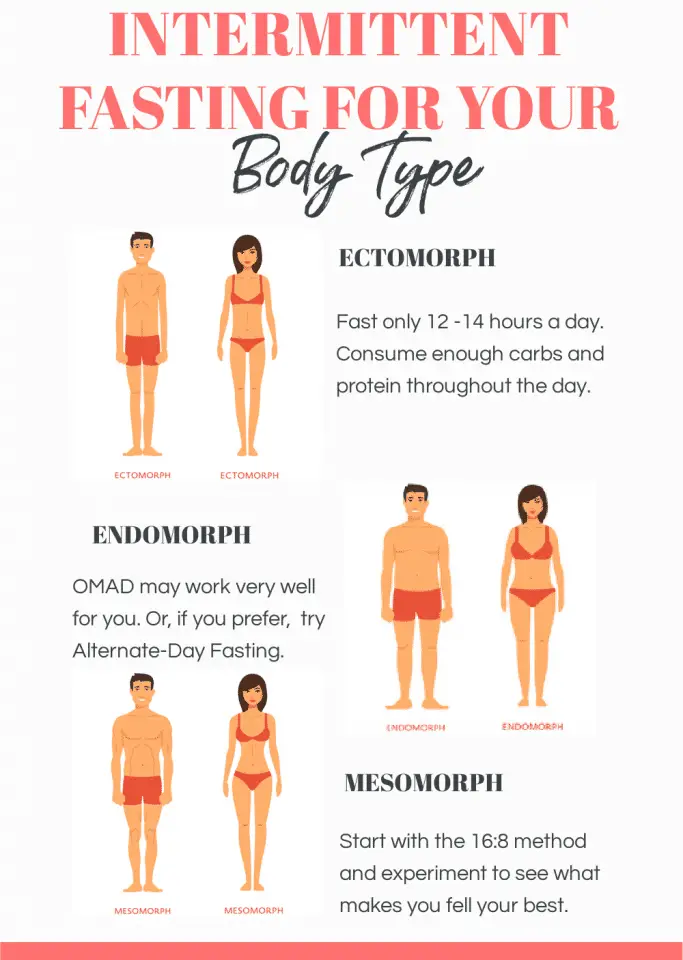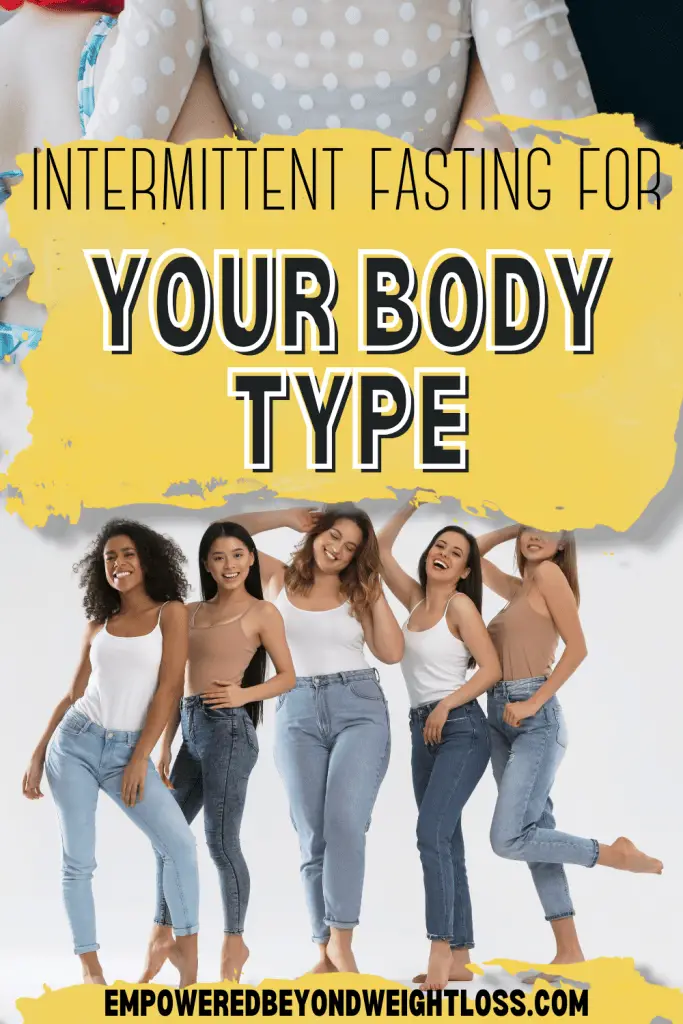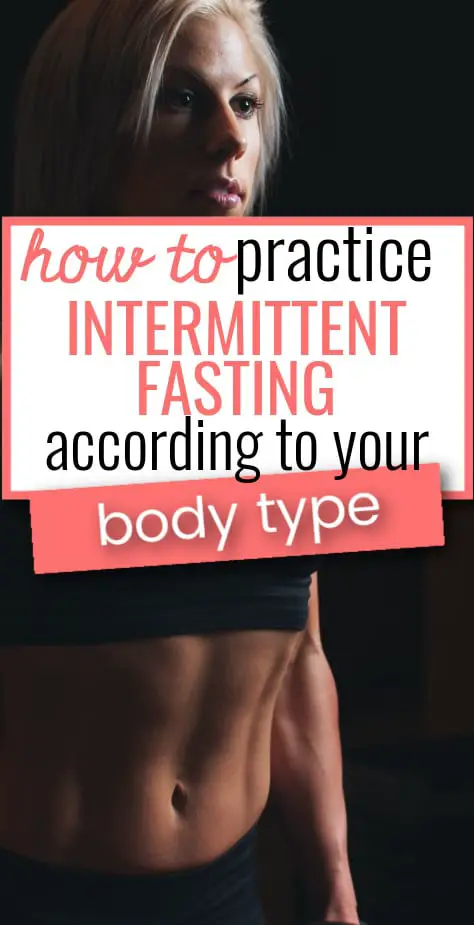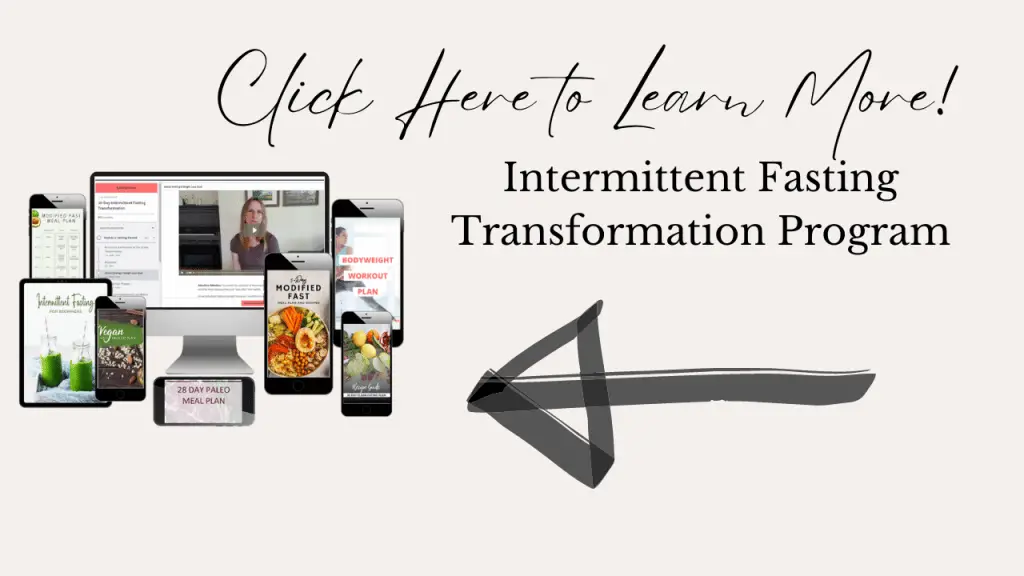I have seen ads online that try to get you to take a test to find out the best type of intermittent fasting according to your body type. I thought the whole concept seemed rather silly, but as I looked for blog post ideas, I found that people are curious about this. What is intermittent fasting, according to your body type, all about? How can you practice intermittent fasting according to your body type, and does it help?

What It Means to Eat for Your Body Type
The idea behind intermittent fasting according to your body type is that your body type, or somatotype, gives clues about your genes, metabolism, and hormonal function. It’s like eating for your blood type, which you may have heard about. Some of us do better with more carbs, others with more protein or fats.
Eating According to Your Body Type: Fact or Fiction?
When it comes to eating according to your body type, people tend to divide into two groups:
- Those who put too much emphasis on body typing.
- Those who dismiss body typing completely.
In truth, there isn’t a lot of research to support the idea that you can eat according to your body type. However, some research suggests that long and lean (ectomorph) tend to have less muscle mass than those with an hourglass shape (or mesomorph). Another paper in Anthropological Review found that your body type may impact your body mass index, dieting, and overall health.
In theory, you could apply some of these concepts to intermittent fasting. Let’s look at intermittent fasting according to your body type with an open mind while using common sense and logic to avoid falling into the pseudoscience trap.

What is Your Body Type?
The three main body types are ectomorph, endomorph, and mesomorph. These somatotypes are the result of the work of psychologist Dr. William Sheldon. In the 1940s, he came up with the idea that body shape and size could help determine personality traits such as assertiveness, aggressiveness, shyness, and sensitivity. His theory was debunked, but his body types lived on, albeit with some modifications and additions.
Ectomorph
The main feature of an ectomorph body type is a thin, narrow, delicate, fragile, linear, and poorly muscled body. People in the ectomorph category have a fast metabolism and struggle to gain muscle. They tend to have a small frame, small joints, long arms and legs, and narrow shoulders. When they build muscle, their musculature tends to be long and slim.

Endomorph
According to Sheldon, this body type was soft, round, pudgy, and overweight. We mostly describe women with this body type as curvy and men as stocky. People in this category tend to gain weight easier, mostly around the belly, hips, and thighs. They have short necks with high and square shoulders.

Mesomorph
The mesomorph body type is kind of like the in-between type. Mesomorph people have medium-sized frames and tend to build muscle easily. They carry more muscle than fat (contrary to the endomorph type). They are not overweight and not underweight. Their weight distribution is fairly even. They have wide shoulders, thick forearms, large hands, wrists, and fingers.

How to Fast According to Your Body Type
Now, how can you practice intermittent fasting according to your body type? Does it even matter? I will be honest with you. I don’t think it matters much. Your body type is just a general image of your body. It’s not a life sentence! However, I can share some insights on how your current body type can impact your fasting experience and how you can achieve the best results depending on your body type.

Intermittent Fasting According to Body Type Test
Still unsure about your body type and would like a body type test to figure it out? I found this test online that you can try.
It will ask you these questions:
- Gender
- If your upper body is pear-shaped (endomorph) or round, V-Shaped (mesomorph), or pretty much straight (ectomorph)
- If you wrap your fingers around your writs, they touch (ectomorph), barely touch (mesomorph), or don’t touch (endomorph).
- If jeans don’t fit, it’s because they are tight in the waist and hips (endomorph), loose in the waist but tight in the hips (mesomorph), and loose in the waist and hips (ectomorph). [I think that’s a stupid test question because jeans will be either tight or loose in the waist and hips depending on whether it is too big or small of a size, not depending on your body type!]
- If you are arms are soft (endomorph), toned (mesomorph), or skinny (ectomorph).
- If your body tends to carry a bit of extra fat (endomorph), look athletic (mesomorph), stay skinny (ectomorph)
Once you figure out your body type, consider the recommendations below for intermittent fasting according to your body type.
Intermittent Fasting for Ectomorph Body Type
The body type that describes you best is the endomorph type; it’s a good idea not to fast too much. The last thing you want is to lose more weight. It’s obvious. Intermittent fasting according to your body type when you are ectomorph is all about the health benefits of fasting.
I recommend fasting only 12 -14 hours a day with maybe a 24-hour fast once every few weeks. Another great idea would be to focus your workout efforts on strength training to look and feel more muscular. Make sure you eat plenty of calories from nutrient-dense foods. Eat a higher proportion of carbs (at least 65%) and ensure you consume enough protein (30 grams three times a day).
Intermittent Fasting for Endomorph Body Type
You can tap into longer fasting periods if your body type is closest to the endomorph type. Intermittent fasting according to your body type, in this case, will result in practicing methods like OMAD (One Meal a Day). Or, if you prefer, you could fast for 36 hours twice a week (this is called Alternate-Day Fasting). These longer fasts will help stabilize your insulin level and limit fat storage. Before experimenting with these intermittent fasting methods, I recommend you become fat-adapted using a keto cycle or a modified fast. Read more about becoming fat-adapted in Ultimate Guide to Intermittent Fasting for Weight Loss.
Intermittent Fasting for Mesomorph Body Type
The mesomorph body type could go for a middle-of-the-road approach. Listen to your body and experiment to see what makes you feel your best. As I was writing this article, I learned that I am a combination of the mesomorph and ectomorph types. I lost 30 lbs after 40 by fasting 18-20 hours 4-5 times a week, which is a pretty middle-of-the-road approach. So, I guess there is some truth to practicing intermittent fasting according to your body type.
Please read How I Lost Weight After 40: My Success Story.

Which Intermittent Fasting Is Best for Weight Loss
Intermittent fasting serves as a tool to improve your cognitive function, delay aging and reduce inflammation. Moreover, it naturally enables you to reduce your calorie intake without relying on willpower alone. You achieve that in two ways:
- Achieving ketosis, which naturally decreases your appetite.
- Limiting the number of hours during which you can eat.
Intermittent fasting is at least as effective as calorie restriction for weight loss. In my experience, it is more pleasant than continuous calorie restriction because it doesn’t require you to feel hungry constantly. Instead, as you become fat-adapted, you feel energetic, focused, and content during your fasting window. And then, during your eating window, you get to eat until you are satisfied! It’s a win-win!
When you pick your intermittent fasting method, ensure that you fast long enough to achieve ketosis but not too frequently to create too great of a calorie deficit. This can be a balancing act!
For more guidance throughout the process, consider my Weight Loss Transformation program. The program includes video lessons, checklists, meal plans, etc.
In Summary
While body types are not all cut and dry, they give you a general idea of your metabolism and may help you decide the best approach to get started with intermittent fasting. Intermittent fasting according to your body type is not an exact science, but it can help you get started as you consider all your options. I recommend you read How to Decide Which Intermittent Fasting Method Is Best for You for further guidance.






